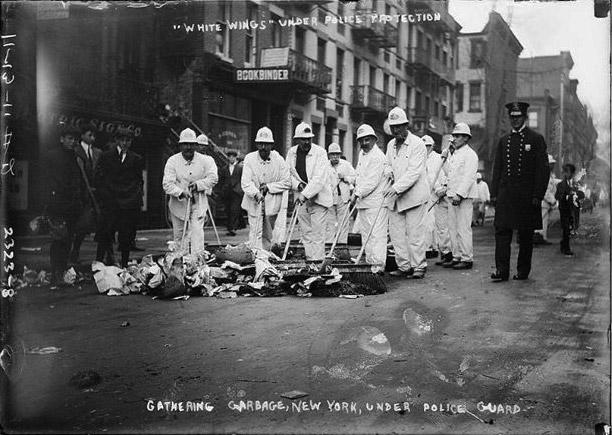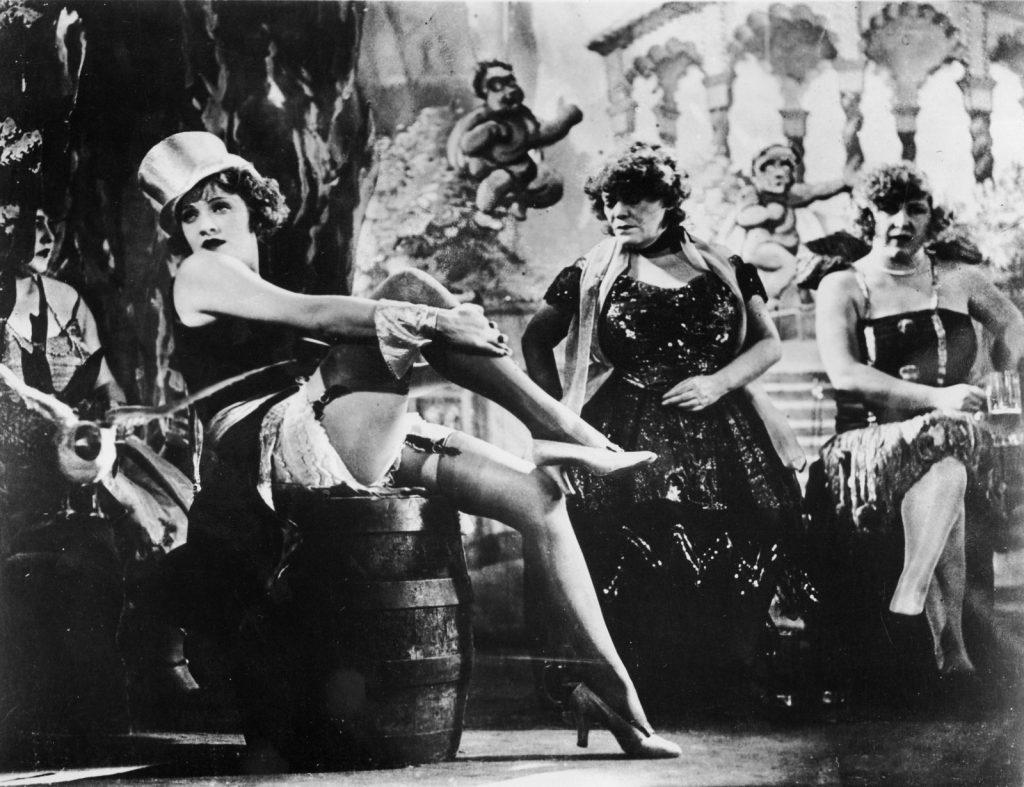
We wear fishnets, black lipstick, sarcastic crucifixes and clothespins for earrings. We write and listen to songs about how we have been rudely and elaborately fucked by the powers that be and about how we now get purposefully and even more elaborately fucked up all on our fucking own, thank you very much, you ignorant, suburban, fascist robot. We don’t believe the embalmed heads on the screen who lament that we’re symptoms that mark the end of Western Civilization, but it sure is a trip to think yourself that important as you tip your drunken self off a spit smeared stage. Reporters–who don’t like to talk about art, at all, ever, in the first place, preferring their stories delivered already either vanilla-flavored or blood spattered and now this monstrosity comes along and looks to be blood spattered as a result of too much vanilla-flavoring–are actually afraid to talk to Patti Smith. She walks in the room. She has hairy armpits. She just looks bored. Her delicious indifference makes you feel like something is happening. Something new. This is a revolution. Or so we explain in super scary, serial-killer lettering to the squares who are no longer called squares because it is square to call a square a square now.
“Phony Beatlemania has bitten the dust.”
Sort of. Maybe. Kind of. Not really. Not a bit. A little bit. Truly. Hardly. The shocks were real. At the time, anyway. As were the fades and flame outs that came after. Long after the clubs have closed for good, one confronts a long-thought-lost mix tape in a shoebox and recite the connections between various histrionic antics in various historic beer halls. One charts on an whiteboard the erasable trajectory of a time travelling aesthetic that connects the self-mutilating twitches of Iggy Pop with the self stimulating ones of the Lizard King, both of whom, so we see now, were mightily smitten with a self-consciously transgressive, bad-actor sensibility that was all the rage in the Weimar Republic, when Nazis and Communists walked around in herky-jerky black and white and threw bricks at each other in the street while, indoors, exhibitionistic loudmoths sported aristocratic monocles and bemoaned their lumpenproletariat jitters, mixing the high and low, the boy and the girl, the old and the new, the snot and the champagne, up there on the cabaret stage, as one will when one finds oneself in participating in a scene that doesn’t know that it is, or that it will eventually become, a scene.
No, Marlene Dietrich didn’t stage dive when she sang, “A Man, Just a Regular Man.” But she sure came close.
Beginning in the late eighteenth century, and until his death due to a hasty decision concerning an influenza epidemic, one supposedly subsided, baggy-eyed and stingy-haired Georg Wilhelm Friedrich Hegel thought about space, and time, and consciousness. He mused about these things while staring at cold, half-eaten plates of bratwurst, discolored hard boiled eggs, dollops of pickled cabbage, and teacups stained by oily coffee. He mused about them too when dropping a few coins into the hand of Christiana Burkhardt, his landlady, for the support of little Ludwig, their baby who squawked from a crib beyond the bounds of matrimony. He mused, aloud, about These Important Things as he spoke over the heads of glassy eyed students hunkered in the drafty lecture halls of the University of Berlin, observing that as often as they took notes, they also watched flies, played that game where you cover one eye with one hand and then the other, scratched themselves.
A recurring dream. Pigeons deliver messages, some written by a Greek tragedian and some by a Greek comedian. These reveal all of the motions and movers of History to him. In daylight hours, from the one-man reviewing stand he hammers together at the front of the lecture hall, he describes how, the night before, he watched Frederick the Great and Louis XVI and Napoleon and several less than notable notables, some on horses, some in tumbrils bound for the guillotine, and some on ships sailing to an island jail, go by. And there was a pattern to this parade, he announced. Historical change occurred, and ushered in a new cast of characters, when two opposing social orders–he called one the thesis, the other the antithesis–could no longer go on avoiding each other. Like litigants in an ugly divorce case, they must eventually meet and settle their many differences. Perhaps with contesting turns of phrase. Perhaps with dueling pistols.
Addressing his lice-bothered students and his as yet unborn intellectual progeny, he further announced that what came after the smoke rolled away from the battlefield was called the synthesis. The synthesis: a third social order, the new, improved ride that emerged from the smoldering, hissing, thesis versus antithesis wreckage. It is unknown as to whether, aside from his pupils, he mentioned any of this to window-washing Christiana and squirming little Ludwig? And what might have been their thoughts if he had? Unsurprisingly, the family’s conversations went unrecorded. One may speculate. One will remain uncertain. In spite of the many, lengthy examinations to which it has been subjected, History still keeps some secrets and still provides surprises.
G.W.F. obviously had more than inkling that much uncertainty was going on here. No surprise, really. Given all of the nearly infinite variables of worldly spirits and individual desire at play, something was almost certain to go awry. In spite of the inevitability of the process itself, nothing, he suspected, was likely to turn out exactly as one expected. He wrote this down as a warning to the revolutionaries, dictators, and astrologers who might have the gall to grab History by the hair and try to make it behave. The synthesis synthesized only stubbornly, after much shouting, mastication, and rumination. The only certainty, he insisted, was that a never fully and immediately functional, fair-is-fair, 50-50 split between the opposing orders would take place, having come about through an inefficient and haphazard process of assemblage he called aufheben.

Aufheben. Although a generally windy guy, Hegel came up with a name of near-pith, near-wit, near-poetry in this instance. Literally, the word means “to pick up.” More suggestively, it implies that one is then going to do something with what one has found. You keep it. Or you get get rid of it. In choosing, you transform it. The penny stays because it will bring good luck. Toss that gross, used, full-of-infection syringe. Almost allegorically, you elevate and preserve or, contradictorily, dispose of and cancel your gleanings. This is holy. That is unclean. The Velvets rocked and the Bee Gees sucked. The Nazis pick up bricks and throw them at the Communists and the Communists throw them back at the Nazis. And both throw them at the dreadful moderate socialists who, as all hardliners know, really suck.
But since the combatants only have what is on hand at any given point in time with which to make their ill-intended points, and as neither the Nazis nor Communists know how badly things will end for them and for the rest of the world, aufheben never welds a synthesis satisfactory to all concerned. The synthesis intends to go out for a drive but, first, backs into the garage. It manages, next, to get on the freeway but then runs out of gas. And the whole thing just goes on and on and on like this, sort of blindly, with the Velvets giving it to Napoleon and Napoleon giving it to the Bee Gees, while History trundles along of its own accord until it reaches something that looks a lot like Stevie Wonder’s higher ground.
Which means: the new is assembled from old parts, some of which have been both buried and unearthed, and, like Victor Frankenstein’s famously grave-robbed work of social distortion, the new may not even be entirely believable at first. The new may not lead to greater clarity or to a better life. It may or may not make sense since logical opposites are notoriously hard to logically resolve. The doctors declare the patient cured until the body rejects the too-bluntly transplanted organ. Rather than speak plainly, the new order may prefer to gibber. It may not care to patch up its holes or ties down its loose ends. It advances by going in circles, devouring itself. The bottom line need not add up.

If there was a Republican civil war, it appears to be over,” Jamelle Bouie wrote in the New York Times on February 17, 2021. “The Republican Party belongs to Trump as long as he wants it.” And so it seems. Once non-negotiable American conservative principles–free trade, a hawkish foreign policy, the disciplined selection of tenured candidates, and a distaste for property destruction and cop-killing–have been given the old heave-ho, tossed overboards like Casey Kasem’s countdown. In their place, in spite of a solid, top-of-ticket beating, idiosyncrasies dribble out of and collect under a bronzed statue of a sickly charismatic leader. The dribbles are praised.
The about face attracts less concern among the double dealers than one might expect. Our very own Hegelian synthesis is getting worked out right in front of us, in real, improvisational time and what the hypocrites come up with may, as warned, turn to be perfectly senseless, hard to listen to, and ghastly to look at.
Sychopany and substance aside, a different kind of civil war has indeed been joined, however, by right-way-thinking strategists and wanna-be alphas. The sour, in-house, backstage squabble is not about policy. Instead, it is over two hostile messaging styles, both of which seek to become the dominant code, one so irresistible as to keep both the old guard and the increasingly paranoid based equally tuned in as the two snarling factions, as yet, still need each other. Ever since it appointed itself as the guardian of the happy-faced, Chamber of Commerce-endorsed, American status quo–when, at the beginning of the 20th century, Theodore Roosevelt took his progressive principles and went home–the Republican party has struggled with a persistent propagandistic hiccup, overcoming it with varying degrees of success, How, in a nation founded through revolution in the pursuit of democracy and equality, do you convince people that nothing should ever change ever again? That those who have, rightly have. That those who don’t, rightly don’t. And, whatever your complaints and circumstances, wherever you find yourself on that spectrum of want and profligacy, you would be wise to get comfortable and vote a straight law and order, authoritarian ticket.
To get people to freely throw and keep themselves in jail is no easy sell. You just try to synthesize all of that cognitive dissonance, pal.

Two tall tales have been special favorites when the faithful get together and have a papering-over party. These yarns have done much to keep the rhetoric of equality from bumping into the reality of oppression, which, should the slightest jostle between the two occur, a jug of nitroglycerin might topple off the shelf and cause an extremely awkward case of widespread combustion.
Tale the first: the freer the market, the freer the citizenry entire. Full of emotion, free of fact, this bit of folk libertarian rah-rah starts from the x-eyed premise that since the boot straps of opportunity have allegedly been cut to the same length, one’s success out there as an employee at Subway, or Walmart, or the new Amazon distribution warehouses on the edge of town, is wholly determined by one’s skill and gumption. If you are dominant, yourself, it is natural that you dominate the slack jawed squirts around you. The principle even sounds sort of scientific. And while the go-ahead to go on oppressing the weak and polite might seem like an odd fit for citizens in the land of the free, it really isn’t: because, you see, the domination trade is open to any sufficiently motivated applicant. Where’s the oppression when everyone gets an equal chance to knock someone down? And to keep them down?
The second tale of the false reconciliation between America’s democratic and authoritarian opposites: the domination of others will ultimately ensure greater freedom for all. Even after hearing the Emancipation Proclamation read aloud to him, Uncle Tom will opt to stick around the Big House for sentimental reasons. The homemaker in Stepford, Connecticut, really does find her Shafley-testified-fulfillment though the constant shampooing of that patch of carpet over there and the fear of domestic retribution from hubby who is always on the lookout for indiscretions, large and slight, has nothing whatsoever to do with her unnatural adoration of the Rug Doctor and the suds and sleeping pills he dispenses. North Vietnam needs our napalm. Why? Because those misguided and troublesome souls over there, hell bent on reckless, selfish self-determination, are going to knock over a world of dominos and before you know it grandma has been euthanized by a socialisticalized death panel. Then the mind control mandarins seize the means of cultural production and tell you, according to some kind of amalgamated-multi-platform-and-device-synchronized-state-and-media five year plan, what television shows you can watch, what jokes you can tell, and what you–and your kids, who, at public school, are being inoculated to hate you on your own, tax paying dime–can think.
It could happen.
Could? It already has. That’s why we had to go check ourselves into all of those discount motels in undisclosed locations throughout the greater District of Columbia area and, following the dawn, smear our own shit around inside the Capitol. When we bite back, we bite back hard. Some extreme, push-back breakage occurred. Some people got their feelings hurt. Some people had to die. Some day you’ll thank us for it.
“Stuff happens,” to quote Donald Rumsfeld on the sacking of Baghdad: “Democracy is messy.”

Such, in various iterations, deployed via the more or less the same narrative gadgets for over a hundred years, is the Republican party’s steady state talking point generator. But, as we know, times have changed, apparently, and values are different, apparently, and these new times and values, apparently, can no longer find adequate accommodation and expression in the fables of yore. The old stylistic thesis of prosperity and sunshine–already a little unstable given all of the fog required to keep the unholy union well hidden–has collided with the antithetical, revolutionary style of Donald Trump and his acolytes. After a century of gridlock, political matter and antimatter eye each other, call each other out, and pick up bricks.
Case in point: the in-your-face, potentially radioactive mish mash of rhetoric issuing from the offices of Josh Hawley, the junior Senator from the Show Me state. Bigly ambitions, by turns aggrieved, sanctimonious, fiery, and child friendly, Hawley plays a strategic game of aufheben, at once relying on conservative storytelling while also daring–shockingly, at least considering the party’s historical reliance upon message repetition–to introduce a new plot line that would cause a lot of agita among the oldsters but would, more importantly, benefit him.
Simon and Schuster pulls the plug on his book, The Tyranny of Big Tech, after Hawley gives raised fist love to the Capitol Hill rioters. Hawley explains this abrupt, late term publication-abortion by drawing upon a favored, same-as-it-ever-was, imaginary victim, authoritarian-as-anti-authoritarian trope that has been long used to preserve white, plutocratic domination and white working class identification with it. He fills the book with breathless, we are threatened and doom is nigh, don’t tread on me jargon. He bravely assures his readers that he is ready to lead a charge to “recover America’s populist democracy.” The enemy used to be Russia, but they turned out to be lame and not-really-very-frightening villains. Foreign terrorists, once similarly bad assed and hell bent, have lately been outdone by domestic ones who can give you the willies pretty much anytime and anywhere. But we need their votes and so it has come to pass that Apple, Google, Facebook, and the rest, pose the “gravest threat to American liberty since the monopolies of the Gilded Age,” Hawley swoons. The very same monopolies, one notes, that Teddy Roosevelt took on and, as a result, was exiled from, or took his leave from, depending on who you ask, the grand old party that didn’t then and doesn’t now want anyone to go and mess around with the fundamental, selectively unregulated, economic forces of nature.
Simon and Schuster, see, are part of this tech and media cartel run by overeducated overloads who live in penthouses. His book wasn’t yanked because corporate heads decided it was a financial loser and could damage the brand. It got yanked because, see, he dared speak unsavory truth to consolidated power. He had become a menace. And so he was gagged and blindfolded by a mob of woke nogoodniks who then left him bound to an uncomfortable chair in the basement. He shrieks, as best as he can, explaining the situation to us in almost incomprehensibly muffled syllables, in the hope that a Good Samaritan, somewhere upstairs, might hear him. Or any one of the 2.4 million Fox News viewers out there might do.

Thus Hawley checks some old stylistic boxes. He has, in this way, done his bit, has paid his mouthpiece dues, has maintained the ideologically static myth of equal opportunity and freedom love that has served conservative administrations–and to a lesser, but genuine, extent liberal ones–so well and for so long. What makes him of particularly nauseous interest just now is that in another, critical way he appears ready to take a wrecking ball to that same sacred lie. Picking up on what many in the Trump administration–Kayleigh McEnany, Mike Pompeo, and William Barr, most publicly–left around for future standard bearers to heben auf, Hawley has embraced a frankly extraordinary notion antithetical to a basic element of America’s thesis for sound government.
That is, he trusts in Jesus. In democracy, not so much.
No more glossing over the painful differences between our inclusive and restrictive impulses. No more making pretend-nice with each other, as both parties have done. We’re in and you’re out. In an unguarded moment of pretend scholarship–perhaps showing off his elite, bicoastal education at Harvard and Stanford, momentarily letting go of his no-book-learning-here, common man vocab–Hawley addressed an audience in 2019 at King’s College, an avowedly Christian bunker in the heart of the ungodly beast known as Manhattan. During his address, Hawley declared that the world’s many ills could be traced back, one and all, to Pelagius, an obscure, fourth century, British monk and theologian.
Pelagius–obviously having gone dangerously off the rails, obviously the very ancient progenitor of arrogant blue state voters–wrote that human beings have the freedom to choose how they live and that God’s grace is the result of doing good works rather than the result of strict obedience to doctrine.
Wrong, wrong, wrong says Hawley. Obedience, says Hawley, not freedom, must be our watchword. Facing down Pelagius’ humanistic blunder is a wildly urgent concern. “Replacing it and repairing the harm it has caused is one of the challenges of our day,” he asserted. If this strikes the ear as un-American sounding, that is because it is. The pilgrims at Plimoth Plantation did not escape religious persecution quite as one of our more dear myths would have it–there were plenty of mercantile and political interests at play as well, as always–but the freedom to worship story is a cherished one, often told, and widely assumed as an American given. The framers of the Constitution, as their emphatic and specific instructions demonstrate, sought to establish a secular republic, not a prescriptive Christian theocracy. Which is precisely where, according to the thinking of Hawley and others, Madison and the rest, like Pelagius–who was accused of heresy and deemed appropriate for burning by none other than Saint Augustine–began dancing around with Satan in yonder dark woods.
In 1790, at a far more turbulent moment in American history, when all sorts of old and new values lay scattered about, awaiting death or glory, the congregants of the Touro Synagogue in Newport, Rhode island, sent a letter of congratulations to the newly elected President. And even George Washington, that racist, aristocratic general of modest education, could draw upon his own embryonic belief in equality and thus write:
…the Government of the United States…gives to bigotry no sanction, to persecution no assistance. … May the children of the Stock of Abraham, who dwell in this land, continue to merit and enjoy the good will of the other Inhabitants; while every one shall sit in safety under his own vine and fig tree, and there shall be none to make him afraid. May the father of all mercies scatter light and not darkness in our paths, and make us all in our several vocations useful here, and in his own due time and way everlastingly happy.
Somehow everything is different this time, so Hawley thinks. So count away, count away, count away your little ballots there, ye sinners, if ye must, but know that doomsday is nigh and ye shall all soon fall into the lower smoke. The Presidential election of 2020, 231 years after the first one, was not stolen just because it was rigged, numbers wise. It was stolen because the wrong guy won. And the wrong guy stole it, you see, from God.

As the not-post-Trump-at-all Republican party puts one boot in front of the other and marches forth, intent, as always, on social, political, and financial domination, it’s impossible to know if the new, gladly theocratic, nakedly dictatorial, authoritarian style will replace the old doublespeak–slavery is freedom, war is peace, poverty is opportunity–used to such damaging and lasting effect. If Hegel dropped an opinion piece in The New York Times he would probably argue that the Republican Civil War is not yet over, but its terms of engagement have been declared. How the thesis and antithesis resolve, however, cannot be predicted, especially when the outcome awaits another antagonism, imminent and unavoidable, with an opponent who subscribes to an altogether different ideology.
Thus the old professor leaves us with questions, of course. Given that the Just-Jesus-and-me crowd and the dark money billionaires behind the shameless voter suppression craze have the same white power, ballot-box-burning agenda, what happens if a suitably articulate, obedient and camera-ready Pastor Jed finds himself with a lot of new friends: ones who, with no shortage of cash on hand, promise him that should he decide to run for something, his campaign shall pass with integrity and safety as it rolls toward rapture? Alternatively, what if Hawley and other prominent Christian Nationalists experience a who’s-that-behind-the-curtain moment and it is revealed that they have, in truth, broadcast their God-talk only so to throw the meek and impressionable off the scent of some plain, old, knife-you-in-the-alley power politics?
This time, the locked and loaded right parts from all of the things that seem the same, while the kumbaya and kombucha left watches and offers commentary, such as this. And both sides wonder: just what will America say now that so much of America, liberated from so many correct and shopworn homilies, has grown so terribly and so plainly bored with itself?


